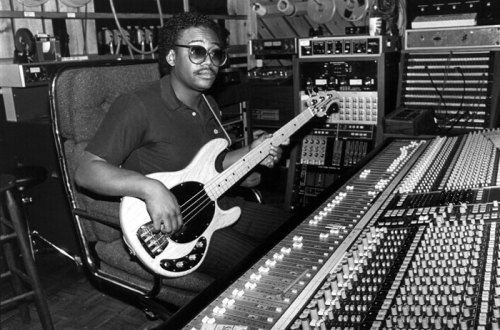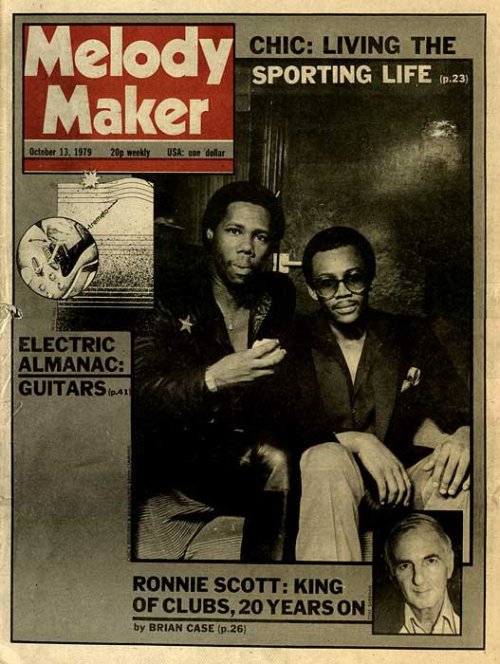My introduction to the work of writing/production team Bernard Edwards and Nile Rodgers came when, as a schoolboy in the early 90s, my classmate (and soon-to-be musical collaborator) Simon Barber enthusiastically thrust a C90 cassette into my hand in the schoolyard, one side of which was graced with a crackly vinyl transfer of CHIC’s second album, 1978’s C’est Chic. I’d recently taken up the bass guitar and, while researching some of the instrument’s greatest exponents, had come across Edwards’ name several times, so I was duly intrigued. What I hadn’t reckoned on was he and his partner being almost instantly catapulted into my personal pantheon of musical demigods.
The songs were almost uniformly catchy and funky, certainly – I’d anticipated as much – but I was also struck by the sleekness of the production and just how much space there was in the music. Then there was the unique, irresistable interplay between Edward’s bubbling basslines and Rodger’s chugging guitar, ably underpinned by Tony Thompson’s crisp drums. The vocals were by turns exultant and sensual. The overall mood of the record was joyous, even life-affirming. When I finally got a glimpse at C’est Chic’s cover, my conversion was complete; the elegance of the music was more than matched by the band’s visual style (inspired by Rodger’s admiration of Roxy Music’s striking aesthetic), and the portrait shot of Nile and Nard that adorned the inner sleeve was (and remains) the epitome of badass. I was, it’s safe to say, enraptured.
Eventually, thanks to snaffling a place on a course at a local performing arts college which (get this) paid me 100 quid a week to turn up, I was able to start building my own record collection, and began with the prompt acquisition of my own vinyl copy of C’est Chic, along with CHIC’s self-titled debut (1977) and their sublime Risqué (1979). The latter is easily their artistic peak, and worth hearing if only for the full, eight-minute-plus version of the hugely influential ‘Good Times’, arguably the apogee of the unfairly maligned disco era, featuring one the most memorable (and ripped off) basslines ever committed to record. Also worth a special mention is ‘My Feet Keep Dancing’, possibly the least musically complex track Edwards and Rodgers ever wrote but combining insistent strings, an unerring eigth-note bassline and a tapdancing(!) breakdown to dramatic, devastating effect:
From a songwriting perspective, Nile and Nard were masters of economy. Their tunes were simple, instantly memorable and often placed within a narrow melodic range (all the easier for people to sing along to), while their song structures usually adhered to a basic chorus-verse-chorus approach; they had little truck with middle-eights. They deviated little from this formula, but deviation simply wasn’t necessary when the results were of such a consistently high quality. One of the best examples of their writing style can be heard in ‘I Want Your Love’ (which opens side 2 of C’est Chic), originally written for Sister Sledge. Check out how the verses are based on just one chord, but the variation in the vocal melody holds your attention until that killer chorus kicks back in:
What’s most staggering is that, at the same time as they were crafting their CHIC masterworks, Edward and Rodgers were also heavily involved in the writing and production of a number of outside projects, chief among them being Sister Sledge’s We Are Family (1979), which boasts no less than four hit singles from its eight cuts: the title track, ‘Lost in Music’, ‘He’s the Greatest Dancer’ and ‘Thinking of You’. Not quite that album’s equal, but still a none-too-shabby affair is 1980’s Diana, produced by the pair for Diana Ross, which spawned further three hit singles, despite enduring a difficult birth thanks to Miss Ross’s infamously prima donna-ish tendencies (not to mention a botched remix which permanently erased a string arrangement from ‘Upside Down’). Each of their outside productions bore the unmistakeable hallmarks of the CHIC sound: the propulsive rhythm section of Edwards, Rodgers and Thompson, sultry vocals, big choruses, spacious arrangements and sweeping strings:
Though the music of The Chic Organization continues to be justly celebrated by fans and critics alike, not to mention discovered by new generations, oft overlooked is its creators’ social and political consciousness and the way in which they wove their ideologies into their work. The overarching message of the Edwards and Rodgers oeuvre is one of mutual acceptance and inclusivity, accentuating the positive and uniting as one in the face of all that’s wrong in the world. Nile & Nard didn’t just want us to move our dancing feet, they wanted to engage our brains into the bargain.





